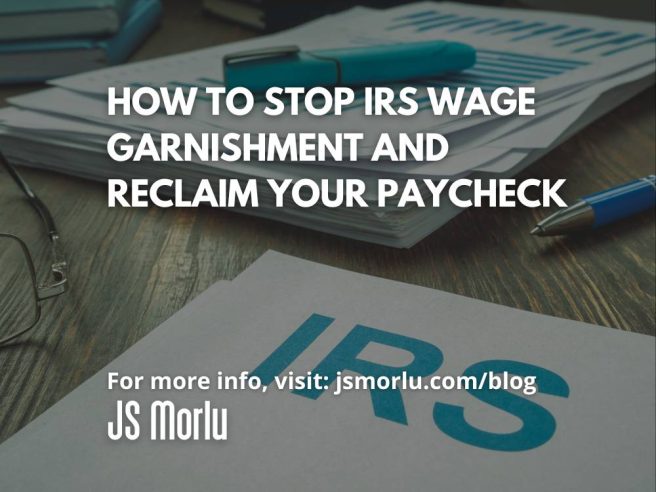Picture This…
It’s Monday morning. You’re sipping coffee, opening your mail, and then—bam—a letter from the IRS catches your eye. As you scan the page, your heart drops at the words: “Wage Garnishment.”
The questions start racing: How much will they take? Can I still pay my rent? Will my employer find out?
If this scenario sounds familiar, you’re not alone. Thousands of Americans face wage garnishment every year. The good news? You have options, and there’s a way out. Let’s break it down.
What Is Wage Garnishment?
Wage garnishment is the IRS’s legal authority to deduct money directly from your paycheck to cover unpaid taxes. Instead of receiving your full paycheck, a portion goes straight to the IRS before it ever reaches your bank account.
It’s a harsh reality, but here’s the key takeaway: It doesn’t have to last forever. If you act fast, you can stop or even prevent garnishment before it starts.
How the IRS Initiates Wage Garnishment
The IRS doesn’t garnish wages overnight. Here’s the process:
- The Early Warnings (a.k.a. “We’re Coming for You” Notices)
Before garnishing wages, the IRS sends multiple notices, such as CP14 and CP501, informing you of unpaid taxes. These letters are your first chance to resolve the issue before it escalates. - Final Notice of Intent to Levy
If previous notices go unanswered, the IRS sends the Final Notice of Intent to Levy (Letter 1058 or LT11). At this point, the IRS is giving you one last warning before taking action. Once you receive this letter, you have 30 days to respond before garnishment begins. - The Garnishment Begins
If you don’t take action, the IRS notifies your employer, instructing them to withhold a portion of your wages. But even if garnishment has already started, you still have options.
The Consequences of Ignoring Wage Garnishment
Ignoring IRS notices can have serious financial consequences:
- Damage to Your Credit Score – Unpaid taxes and garnishments can hurt your credit history.
- Strained Employer Relationship – Employers must comply with IRS demands, but repeated garnishments may impact your professional standing.
- Ongoing Financial Stress – The IRS continues garnishment until the debt is settled or another arrangement is made.
The moment you receive a notice is the moment to act. The sooner you address the issue, the better your chances of stopping garnishment in its tracks.
How to Stop or Prevent Wage Garnishment
The good news? You have multiple ways to fight back and stop wage garnishment.
- Negotiate an Installment Agreement
Setting up an IRS installment plan allows you to pay off your tax debt in smaller, manageable amounts. Once an agreement is in place, the IRS typically halts wage garnishment as long as you stick to the plan. - Offer in Compromise (OIC)
This option allows you to settle your tax debt for less than you owe—if you qualify. The IRS considers your income, expenses, and ability to pay before accepting an offer. A tax professional can significantly improve your chances of approval. - Request a Collection Due Process (CDP) Hearing
If you receive a Final Notice of Intent to Levy, you have 30 days to request a Collection Due Process hearing. Filing for a hearing temporarily suspends garnishment while the IRS reviews your case. - Prove Financial Hardship
If garnishment prevents you from covering basic living expenses, you may qualify for Currently Not Collectible (CNC) status. While this doesn’t erase your tax debt, it stops IRS collection efforts (including garnishment) until your financial situation improves. - File for Bankruptcy (Last Resort)
In extreme cases, filing for Chapter 7 or Chapter 13 bankruptcy may halt garnishment. However, this should be a last resort, as bankruptcy has long-term financial consequences.
Why You Need a Tax Professional
Navigating the IRS’s complex rules alone can be overwhelming. Here’s why working with a tax professional is a smart move:
- Expert Negotiation – A tax pro understands IRS guidelines and can negotiate the best resolution for you.
- Faster Relief – Professionals know which forms to file and what steps to take for the quickest resolution.
- Protection of Your Rights – They ensure the IRS follows proper procedures and doesn’t overreach.
- Peace of Mind – Instead of spending hours on hold with the IRS, you can focus on your life while an expert handles your case.
Our Promise: We’ve Got Your Back
If wage garnishment is keeping you up at night, you don’t have to face it alone. Our team specializes in helping people just like you regain control of their finances. We provide:
- A Judgment-Free Zone – No lectures, just solutions.
- Personalized Game Plans – Every financial situation is different, and we tailor strategies to fit yours.
- Clear Communication – No IRS jargon—just clear, actionable steps.
- Fast Action – The sooner you act, the sooner you get relief.
Take Control of Your Financial Future
Imagine opening your paycheck and keeping every dollar you earned. Imagine a life without the fear of IRS letters or wage garnishments. That future is possible—but only if you take action now.
📞 Call us today or 📩 email us for a free consultation. The sooner we start, the sooner you can get back to financial stability.
🔹 Your paycheck belongs to you—let’s keep it that way.
JS Morlu LLC is a top-tier accounting firm based in Woodbridge, Virginia, with a team of highly experienced and qualified CPAs and business advisors. We are dedicated to providing comprehensive accounting, tax, and business advisory services to clients throughout the Washington, D.C. Metro Area and the surrounding regions. With over a decade of experience, we have cultivated a deep understanding of our clients’ needs and aspirations. We recognize that our clients seek more than just value-added accounting services; they seek a trusted partner who can guide them towards achieving their business goals and personal financial well-being.
Talk to us || What our clients says about us


